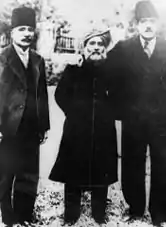Sulaiman Nadvi
Sulaiman Nadvi (Urdu: سید سلیمان ندوی—Sayyid Sulaimān Nadwī; 22 November 1884 – 22 November 1953) was a Pakistani historian, writer and scholar of Islam. He co-authored Sirat-un-Nabi and wrote Khutbat-e-Madras.[1]
Syed Sulaiman Nadwi | |
|---|---|
 Syed Sulaiman Nadvi (m), with Ross Masood and Allama Muhammad Iqbal in Afghanistan | |
| Personal | |
| Born | 22 November 1884 |
| Died | 22 November 1953 (aged 69) |
| Religion | Islam |
| Main interest(s) | History, Seerah, Urdu Literature |
| Notable work(s) | Khutbat-e-Madras, Sirat-un-Nabi, Arb-o-Hind Ke Talluqat, Naqoosh-e-Sulaimani |
| Founder of | Darul Musannifeen (Shibli Academy), Azamgarh |
| Muslim leader | |
| Disciple of | Ashraf Ali Thanwi |
| Part of a series on |
| Deobandism |
|---|
 |
| Ideology and influences |
| Founders and key figures |
|
| Notable institutions |
| Centres (markaz) of Tablighi Jamaat |
| Associated organizations |
Early life and education
Sulaiman Nadvi Nadvi was born on 22 November 1884 in the Desna, Bihar a village of Patna (then in British India). His father, Hakeem Sayyed Abul Hasan was a Sufi.[1][2]
Sulaiman Nadvi was influenced by Shibli Nomani at Lucknow. In 1906, he graduated from Nadva. In 1908, Nadvi was appointed as an instructor of Modern Arabic and Theology at Dar-ul-Uloom Nadva. His contemporary at Nadva was Abul Kalam Azad who had come from Calcutta and also joined the Nadva.[1] Both Sulaiman Nadvi and Abul Kalam Azad were favorite pupils of Maulana Shibli Nomani.[1] Sulaiman Nadvi became one of the biographers of the Prophet of Islam and a historian during his own lifetime.[1]
Aligarh Muslim University conferred on him the honorary degree of Doctorate of Literature (DLitt) in 1941.[1]
Contribution to Islamic literature
In 1933, he published one of his major works, Khayyam. The nucleus of this book was an article on noted Persian scholar and poet Omar Khayyam.[3][4][2]
Sulaiman Nadvi, along with others who favored Hindu-Muslim unity in British India, suggested that the term "Urdu" be abandoned in favour of "Hindustani" because the former conjured up the image of a military conquest and war whereas the latter had no such symbolic baggage.[5]
Sulaiman Nadvi founded Darul Musannifeen (Academy of Authors), also known as the Shibli Academy, at Azamgarh. The first book published there was Ard-ul-Quran (2 volumes).[1][2]
Later life and death
In June 1950, Nadvi moved to Pakistan and settled in Karachi. He was appointed Chairman of Taleemat-e-Islami Board to advise on Islamic aspects of Pakistan's constitution. He died on 22 November 1953 in Karachi at the age of 69.[6][2]
However, his son Salman Nadwi asserts that they didn't move to Pakistan with the intention of migration. Right after they reached Pakistan, Sulaiman Nadwi's health deteriorated and he tried unsuccessfully to get his permit extended from the Indian embassy, which caused grief and pain.[7]
Literary work
Nadvi's works include:
- Ahl-us-Sunnah-wal-Jamā‘ah[6]
- The Arab Navigation, lectures delivered in Bombay during March 1931.
- Khayyam (about the contributions of Omar Khayyam, published in 1933)[1][2]
- Khutbat-e-madras[2]
- Rahmat-e-Aalam[6]
- Seerat-e-Aisha[2]
- Sirat-un-Nabi (Life of the Prophet) by first Shibli Nomani, the teacher of Sulaiman Nadvi. Shibli started writing this book, which was later finished by Sulaiman Nadvi after Shibli’s death in 1914.[1][2]
References
- Profile of Sulaiman Nadvi on shibliacademy.org website Published 23 March 2009, Retrieved 9 October 2019
- Profile and books by Sulaiman Nadvi on Archived Open Library (California State Library) website Retrieved 11 October 2019
- Syed Sulaiman aur Tibb Unani by Hakim Syed Zillur Rahman, Mutallae Sulaimani, Edited by Prof. Masoodur Rahman Khan Nadvi and Dr. Mohd. Hassan Khan, Darul Uloom, Tajul Masajid, Bhopal, 1986, p. 285-293
- Syed Sulaiman Aur Tibb Unani by Hakim Syed Zillur Rahman, Akhbar-ul-Tibb, Karachi, Pakistan, Nov. 1987, p. 9-12
- "Myths about Urdu". DAWN (newspaper). 26 November 2009. Retrieved 11 October 2019.
- Profile and graveside monument of Sulaiman Nadvi in Karachi, Pakistan Retrieved 9 October 2019
- Mufti Ata-ur-Rahman Qasmi. "A discussion with Professor Salman Nadwi regarding Mawlana Abul Kalam Azad". Mawlana Abul Kalam Azad: Ek Tajziyati Mutala [Mawlana Abul Kalam Azad: An analytical study]. New Delhi: Mawlana Azad Academy. pp. 468–480.
